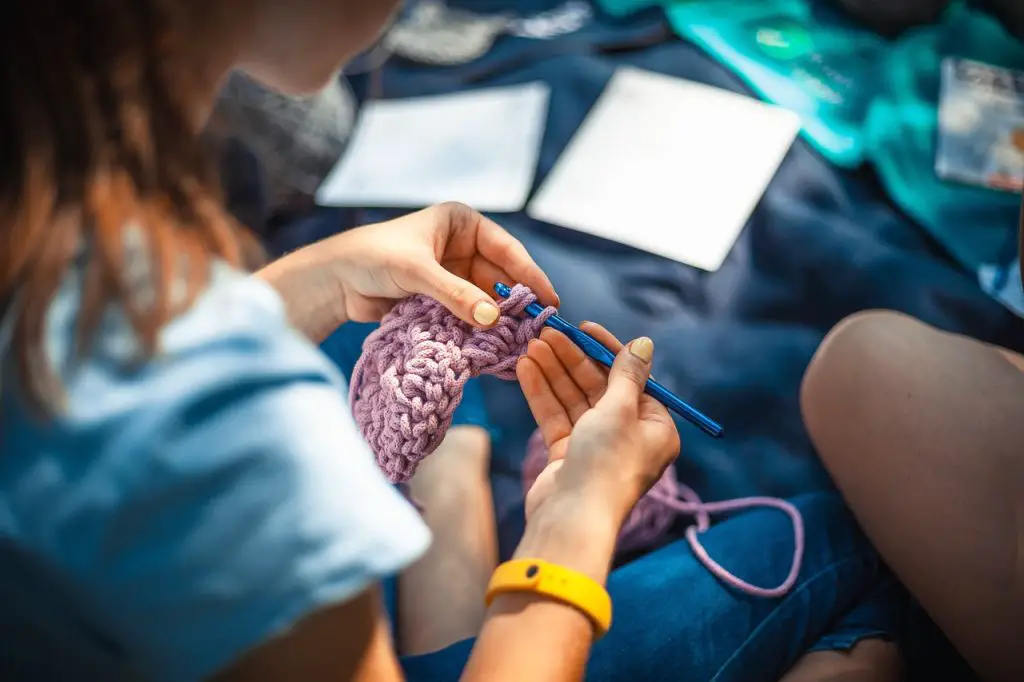Knitting and crocheting are unique and enjoyable hobbies! They have many benefits to both your mental and emotional health, as well as strengthening important social skills. Not only can they help reduce stress levels by focusing on a task or calming the mind, but they can also be an incredibly rewarding experiences for both beginners and experienced crafters alike. With effects ranging from improved neural connections in the brain, to enhanced fine motor skills, hand-eye coordination, cognitive functioning, creativity and more – knitting and crocheting will have you feeling calmer, stronger and more creative than ever before!
While it may seem like a daunting task, they are both quite easy to pick up. All you need are some needles and yarn, and you can start creating your pieces of clothing or home decor. If you’re looking for something new to do while stuck at home, why not give knitting or crocheting a try? You might be surprised at how much you enjoy it!
If it’s that time of year when cold weather is on its way, it’s time to get yourself in the spirit. Maybe you’re already in the process of putting together your favorite sweater for winter or grabbing an extra-warm scarf. But if you’ve been thinking about knitting or crocheting, the time is now to learn this rewarding hobby and reap the benefits. We are going to discuss the benefits in-depth and why you should add this activity to your list of crafts. It is a craft that involves using two needles to create a fabric or textile. It is often used to make clothing. However, it can also be used to make other items such as blankets, hats, and scarves. Read on to find out all of the 12-amazing physical, mental & social benefits of this knitting and crocheting!
Mental and Health Benefits of Knitting and Crocheting
Sharpens Your Mind and Cognitive Function
To craft, you have to constantly be making split-second decisions based on the pattern you’re following and the yarn you’re using. This process of decision-making activates the part of your brain responsible for memory and spatial perception. This allows you to better visualize things in three dimensions. These crafts require a high level of focus and concentration.
Mental function can also be improved in a variety of ways through knitting and crocheting. One study found that they can help improve memory in dementia patients. Another study found that older adults who knitted had a significantly lower risk of developing cognitive decline than those who didn’t incorporate. The rhythmic movement of these hobbies also improves cognitive function. The same goes for your mind; it becomes sharper and better at problem-solving with the consistent practice of knitting. So, if you’re looking for a way to boost your brainpower, pick up some needles today!

Improves Memory and Strengthens Neural Pathways
According to the Journal of Neuropsychiatry and Clinical Neurosciences, patients with Alzheimer’s who participated in knitting activities showed improvement in their memory. The study found that those who engaged in knitting had better cognitive functioning and were able to remember more information than those who didn’t knit. The researchers believe that the repetitive nature of knitting may help to keep the brain active. It also may help to delay the onset of dementia. The study found that the act of knitting can help stimulate the part of the brain responsible for motor skills and cognitive function. This is because the motor skills involved in knitting and crocheting help to keep the brain active and engaged. The cognitive benefits of knitting have been well-documented, and include improved memory, and concentration skills. So, if you’re looking for a way to improve your memory, start knitting or crocheting.
Improves the Level of Concentration
When people knit or crochet, they have to focus on the task at hand and pay attention to what they are doing. This can help improve concentration and attention span. This is because the act of these hobbies engages both the left and right sides of the brain. The left side controls logical and sequential thinking, while the right hemisphere is responsible for more creative tasks. When you knit or crochet, your brain has to keep track of both the pattern and the tension on the yarn. This back-and-forth between sides strengthens connections between them, leading to improved focus overall. If it’s something repetitive like a scarf, you can zone out and let your mind wander. But if it’s something more complicated that requires following a pattern, your brain has to stay focused on what you’re doing. Either way, both types of projects can help increase concentration.
Therapy for Addiction Recovery
These pastimes are becoming increasingly popular as forms of therapy for those struggling with addiction. With its calming and creative benefits, it can provide an effective outlet to help distract from urges and cravings. When you finish a project, it also provides a sense of accomplishment.
Knitting and crocheting also encourages mindfulness and relaxation, which are two important skills in overcoming addiction. Additionally, they can help build self-esteem and confidence as new projects become more complex over time. Your mental health improves with this increased confidence. This leads to healthier habits overall that may reduce the risk of relapse into old behaviors associated with addiction. By offering a therapeutic activity that requires concentration and focus, knitting and crocheting provide individuals struggling with addiction an opportunity to practice positive coping strategies in order to move forward on their healing journey.

Reduces Stress & Boosts Self-Confidence
Studies have shown that knitting and crocheting can help in reducing stress, anxiety, and even depression. It helps to relax the mind and body, providing a buffer from life’s worries. The rhythmic motion can also be soothing, providing a meditative experience that can help relieve stress. They also encourage mindfulness which is an effective way to manage mental health issues. The benefits of knitting and crocheting is not just for mental health! It can also increase self-confidence too. Taking on a new project or mastering a stitch gives you a sense of pride and accomplishment! This also boosts your self-esteem as well as provides physical evidence of what you are capable of achieving! Knitting and crocheting offer creativity, and problem-solving opportunities and gives structure to our lives. These opportunities help us gain control over our emotions while keeping us engaged in something productive rather than ruminating on negative thoughts.
A Benefit of Knitting is to Stay Warmer
Knitting and crocheting are age-old crafts that help to keep you warm and snug during the winter months. It has been said that knitting is like giving yourself a warm hug from the inside out. There are few things more comforting on a cold winter’s day than wrapping up in a hand-knitted sweater or scarf. Not only does it provide comfort, but the process of crafting something with your own hands can also provide therapeutic benefits. Many people find the rhythmic clicking of their needles both calming and meditative.
Strengthens Your Upper Limbs
We know that knitting and crocheting are great ways to relax and de-stress, but did you know that they can also help strengthen your upper limbs? That’s right – by working the muscles in your arms and shoulders! These hobbies can help keep them strong and healthy. The rhythmic nature of them can help to improve coordination and fine motor skills in the upper limbs. The movement required to knit and crochet can help to increase muscle tone and improve the range of motion in the shoulders, elbows, and wrists.
For many people who suffer from arthritis or other conditions that cause pain and stiffness in these joints, these hobbies can be therapeutic. Those who take them up can develop stronger muscles in their arms and hands. The movement of the needles back and forth helps to work out any stiffness in the muscles and joints, while the act of crafting itself can help improve dexterity.
Social Benefits of Knitting and Crocheting
These crafts can do more than just create beautiful sweaters and throw blankets; it is a skill that has social benefits as well. Learning how to knit or crochet can be an incredibly rewarding experience that brings with its opportunities for personal development. It encourages concentration and problem-solving, which in turn helps develop coordination, patience, and discipline. Additionally, it is a wonderful way to meet new people and join communities of fellow crafters! This community can also share tips and tricks with each other over coffee or a hot mug of tea. By uniting a diverse mix of individuals with an appreciation for natural fibers, knitting and crocheting encourage acceptance, friendship, and pride in craftsmanship. It even encourages respect for traditional methods in handicrafts across the world.
Disconnects from the Digital World
It is easy to get lost in a sea of screens and notifications in our increasingly digital world. Our phones, laptops, and TVs are constant sources of stimulation, and it can be hard to break away from them. But spending too much time staring at a screen can be detrimental to our health, both mental and physical. That’s why it’s important to take some time for a digital detox now and then. And there’s no better way to do that than by picking up a pair of needles.
These hobbies are the perfect activities for disconnecting from technology and taking some time for yourself. When you knit or crochet, you have to focus on what you’re doing. This means you can’t also be scrolling through your Facebook feed or checking your email. It forces you to be present in the moment. Which is something we could all use a little more of these days!
Helps in Building Good Habits
Habits are built through repetition, and eventually, they become second nature. When you knit or crochet regularly, it becomes a part of who you are. You don’t have to think about it, you just do it. This can be a good thing or a bad thing depending on the habit. Some might see these hobbies as a waste of time, but the reality is that it can be quite beneficial. For one, it helps to keep your hands busy so you’re less likely to engage in other unhealthy habits like nail biting or smoking.
When you sit down to knit or crochet, you are building a good habit. You are sitting down to do something constructive with your hands. In addition, the repetitive nature of knitting can help build good habits in other areas of your life. For example, if you start doing this every night before bed, you may find yourself naturally developing a nightly routine that includes winding down for sleep and waking up refreshed and well-rested.
Cultivates Personal Communication
When you are focused on the process of knitting or crocheting, you are not thinking about anything else. This allows you to be fully present in the moment and to listen to what the other person is saying. It can be easy to get caught up in our thoughts and miss what someone is trying to tell us. However, if we are focused on crafting, we can give that person our full attention.
These hobbies also require patience and concentration. These two qualities are essential for effective communication. If we are patient while someone is speaking, we are more likely to understand them and their perspective. And if we can concentrate on what they are saying, we can better retain the information they are sharing with us. So, next time you need to have a difficult conversation or just want to cultivate better personal communication, try picking up some needles and yarn.
Encourages a Sense of Community and Connection
These crafts can be a solitary activity, but often it is something done with others. Knitters and crocheters come together in groups to learn new techniques, share patterns and stories, discuss successes and challenges of their current projects, or even just socialize while they work on their projects. These circles help build community by bringing people who have similar interests together. This provides an environment for sharing ideas and experiences. In addition to the physical gathering in person, there are many online forums where enthusiasts can connect with other crafters from around the world. Here you can ask questions about specific projects or techniques, find out about upcoming events related to knitting or crocheting in their area, or get advice from more experienced craftspeople. All these things contribute to building a sense of camaraderie among those passionate about this hobby.
Emotional Benefits of Knitting and Crocheting
There are many emotional benefits to be gained from taking up knitting or crocheting. Not only can it be an enjoyable and relaxing hobby. It’s also been shown to bring about feelings of accomplishment when a crafter creates something new. By crafting something with two hands, you’ll gain a valuable sense of satisfaction that often isn’t achievable through other activities. Knitting and crocheting are also great ways to connect with friends and family members. It is a hobby that is easy to enjoy in the company or even virtually through video chat. They can also provide the soothing effects of mindfulness! It allows the knitter or crocheter to dream freely onto their needles. Whether they envision cozy sweaters, hats, gloves, or other garments, every creation starts off as an idea in mind.
Overall Benefits of Knitting and Crocheting
From reducing stress to improving your mood, knitting and crocheting are great ways to relax and de-stress. Additionally, they can help improve your concentration and focus, as well as keep your body active and toned. If you’re ever feeling down or out of ideas for how to spend your free time, give these crafts a try. You might be pleasantly surprised at the rewards they bring. If you are not already a knitter, visit our New Knitters section to get started knitting today!
